(This is rerun of a post that originally ran on August 5th, 2015.)
As a child of the 80s, I grew up watching a lot of weird stuff. My parents love movies, from glorious technicolor musicals (hi, mom!) and classic comedies to Westerns and all Kubrick films (hey, dad!), and as the oldest kid I was their pop culture guinea pig as they tried their best to figure out what kind of entertainment would fly with little ones, and what would just straight-up freak us out. But of course, they soon found that mileage tends to vary in a big way—spooky movies that amused me to no end gave my younger brother crazy nightmares, while other scenes that completely disturbed me had zero effect on him, and so on. Kids are fun like that.
Of course, having a strong emotional reaction to a movie or a particular scene isn’t necessarily a bad thing, and sometimes the moments we find most upsetting end up sticking with us long after we’ve processed those emotions. I’m sure everyone has a list of the movies that deeply affected them, growing up, and we’d love to hear your stories in the comments, if you care to share! In the meantime, here are my own personal top five trauma-inducing movie moments from childhood (mostly), in no particular order…
Artax Succumbs to the Swamps of Sadness—The NeverEnding Story
Oh, Artax. Other generations had Old Yeller or Bambi’s Mom or saintly Charlotte (of the titular Web) as their Spirit Animals of childhood trauma, ushering them gently into a precocious awareness of the harsh realities of mortality and loss. For better or worse, children of the 80s got the spectacle of a depressed horse sinking into the ghastly black depths of the Swamps of Despair, as his tearful, panicked human companion sobs and screams at him to fight against the sadness crushing in on him. It’s…pretty messed up.
Even knowing that Artax is restored to Atreyu at the end of the movie never did much to assuage my horror at this scene as a kid—I always broke around the point where Atreyu screams “Stupid horse!” as he pulls desperately on Artax’s bridle. It wasn’t just the sudden and tragic death of a beloved animal that was so upsetting (although I’ve never been good at handling that particular type of ordeal)—looking back, I think it was the idea that your emotions could be so overpowering that you couldn’t control yourself, or your actions, that disturbed me almost as much as the sinking horse. The idea of being so sad that you can’t fight to save yourself was just a horrific concept to me as a little kid who knew nothing about depression or mental illness, and frankly, it’s not the most comfortable scene to watch even now, almost three decades later.
But no matter how deeply (or not) Artax’s death affected you back in the day, at least I’m happy to report that all those morbid rumors that the horse used in the movie actually drowned during the scene are apparently completely false (there was an accident on set and Noah Hathaway, who played Atreyu, was injured, but the horse was unscathed.) And then probably went on to live the greatest horse life ever, eventually ascending directly into Equine Heaven alongside Secretariat, Fatty Lumpkin, and Li’l Sebastian, THE END.
A Child’s Guide to Conspiracy, Assassination, and Betrayal—The Secret of NIMH
As with The NeverEnding Story, I adored The Secret of NIMH when I was little, in spite of (or possibly because of) its stranger and darker aspects. The story throws its field mouse heroine, Mrs. Brisby (changed from “Frisby” in the book) into the path of a monstrous cat, a creepy owl, and all sorts of other dangers, all while she’s grieving the death of her husband, Jonathan, and attempting to save one of her children from a life-threatening illness.
While she encounters allies among the rats of NIMH (whose lifespans and intelligence have been expanded in a series of experiments), she also finds herself at the center of a power play by the film’s cunning and ruthless villain, Jenner. When Nicodemus, the wise, kindly leader of the rats, agrees to help move the Brisby home to safer ground, Jenner sees his opportunity to seize power and advance his own nefarious aims. He plots to murder Nicodemus by cutting the ropes during a critical point in the move, crushing the elder rat while conveniently making his death look like an accident.
Jenner’s slick façade quickly comes crumbling down when he attacks Mrs. Brisby in a frenzied attempt to silence her (and steal the magic stone Nicodemus entrusted to her earlier in the film). In the ensuing struggle, he wounds Justin, the Captain of the Guard, and slashes the neck of his former crony, Sullivan, when he attempts to intervene. Justin stabs Jenner and leaves him for dead, but Jenner manages to creep up behind Justin in order to deliver a killing blow. At the last second, the mortally wounded Sullivan hurls his dagger into Jenner’s back, redeeming himself and saving Justin’s life.
It’s an incredibly thrilling, beautifully animated couple of action scenes which reveal a level of villainy, betrayal, and violence that’s practically Shakespearean in its scope—Jenner is as calculating as he is merciless, and it certainly sets him apart from most other villains of children’s movies. The fact that he carefully plots (and successfully carries out) the cold-blooded murder of Nicodemus is still one of the more surprising aspects of the film, and that treachery certainly stuck with me over the years as an example of ruthless, pre-meditated evil.
George Lucas Loves An Orphan—Ewoks: The Battle For Endor
I might be one of the only people who vividly remembers the beginning of 1985’s sequel to The Ewok Adventure (aka: Caravan of Courage), but it was an oddly formative moment for me, and not in a particularly positive way. The made-for-TV movie focuses on Cindel Towani, the flaxen-haired moppet who had starred in the previous film, which saw Cindel and her brother happily reunited with their parents at the end, with the help of Wicket and the other Ewoks. As the sequel opens, their family is preparing to leave the forest moon of Endor when a savage band of marauders attacks—both parents are wounded, and Cindel is forced to escape with Wicket, leaving her family behind to their doom.
As a big fan of the earlier movie, I was already pretty invested in the Towani clan, since the whole first movie centers on getting Cindel and Mace safely back to their parents. More than that, I was basically the same age as Cindel, the main protagonist, and obviously identified with her to a certain point (I mean, what 80s kid didn’t want an awesome Ewok buddy to hang around with? All I really wanted was an Ewok, or maybe a Mogwai, and my six-year-old bucket list would have been beautifully complete.) So when the second installment started off by killing off Cindel’s parents, I completely and immediately rejected the first 15 minutes of the movie or so, because the idea was so utterly terrifying to me.
Obviously, kids then and now encounter plenty of absent/missing/dead parents in the world of children’s entertainment, but something about seeing Cindel go from part of happy nuclear family to orphan-on-the-run in a few abrupt minutes really messed with my head. Not that I stopped watching The Battle for Endor—instead, I’d always ask my parents to fast-forward past the unpleasantness, and would repeatedly reassure them and my brother that “Cindel’s family probably got away” from the bad guys. I mean, we don’t actually see them die, even though Cindel seems pretty definite that she’s an orphan, and is quickly paired up with certified consolation grandpa Wilford Brimley, who presumably helps to fill the family-shaped void in her psyche with his excellent mustache and random curmudgeonly mutterings.
Sigh. Damn you, George Lucas.
So. Much. Animated Rabbit Blood—Watership Down
I’m not going to choose a particular scene, because I think it’s safe to say that very young viewers might find themselves fairly traumatized by the film as a whole, without pointing out any particular moment of climactic violence. If you’re not prepared to see a bunch of grisly rabbit injuries and deaths (no matter how subtly or artfully the surrounding story is presented), then you may want to hold off on Watership Down.
The movie starts off with a rabbit creation myth in which an act of rabbit hubris results in a divine smackdown, as the predators of the world are unleashed upon rabbitkind and begin gleefully (and graphically) slaughtering the peaceful and unsuspecting bunnies. The movie then switches to the more realistically-animated tale of Hazel, Fiver, and their quest to survive in the face of these ancient enemies and more modern, man-made dangers.
Don’t get me wrong—Watership Down is a beautiful film, but it’s also a brutal portrayal of the fear and desperation of these creatures at the bottom of the food chain, and the violence that stalks their every move. It does not shy away from disturbing images, which include (but aren’t limited to): trippy visions of blood-soaked fields, a rabbit choking to death in a snare, a sequence in which an entire rabbit warren is gassed and destroyed using farm equipment, Hazel getting shot and chasing the Black Rabbit of Death, some intensely bloody rabbit-on-rabbit violence, and a horrifying encounter with a vicious dog. I was captivated by the movie, as a kid, but I was also deeply disturbed by it—as I got older, I read and loved the novel it was based on, but if I had to do it over, I would have preferred to watch the movie after reading the book, when I was a bit older and better able to contextualize the images and experiences being represented, and the emotional reactions they produced.
You Are Who You Choose To Be—The Iron Giant
All of the previous movies on this list I’d seen by the time I was six or seven years old; when The Iron Giant came out, I was in college, and probably thought of myself as being pretty jaded at the time (I mean, kids raised on Watership Down have seen some stuff, you know?)
I hadn’t cried at a movie in years, and certainly wasn’t prepared to be knocked off my emotional high horse by the likes of Hogarth Hughes and his goofy metal-chomping mega-robot, but the retro design looked amazing and I’d heard good things, and so I pressed play one day and completely fell in love in almost no time. And when I came to the scene in which (*spoilers*) the Iron Giant sacrifices himself to save Hogarth and the rest of the town by intercepting an incoming missile, I was absolutely gutted. To this day, I can’t watch the scene, with the Giant smiling to himself and murmuring “Superman” as he slowly closes his eyes, without crying buckets. I’ve tried—it doesn’t matter how many times I’ve seen it, it just destroys me with its perfect combination of inexorable sadness and sheer, triumphant, heroic joy.
And while I’m always delighted when the scattered bits of the Giant begin to reassemble themselves at the end, it doesn’t make that one brilliant moment of self-sacrifice any less beautiful or devastating to me. That moment is everything, and even though the older I get, the more I tend to tear up over movies (and TV, and occasionally books and articles…and sometimes the odd commercial, if we’re being totally honest), I’m always grateful for the emotional touchstone that it’s become for me, over time.
Looking back at this list, it’s probably telling that all but one of the movies I’ve mentioned here were adapted (with varying degrees of faithfulness) from books—although I wasn’t aware of that fact, as a child. Perhaps a separate reckoning of similarly memorable moments in fiction might be in order, somewhere down the line. In the meantime, though, I’d love to hear about all the striking, shocking, sad, or trauma-inducing movie moments that have stuck with you over the years, for better or worse…
Bridget McGovern is the managing editor of Tor.com, and clearly watched way too many potentially disturbing movies as a kid. She regrets nothing.










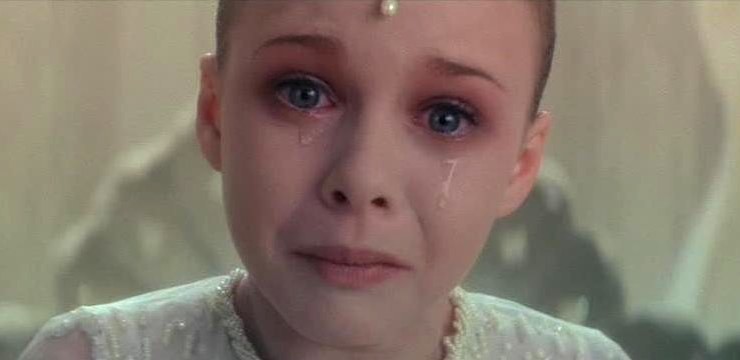
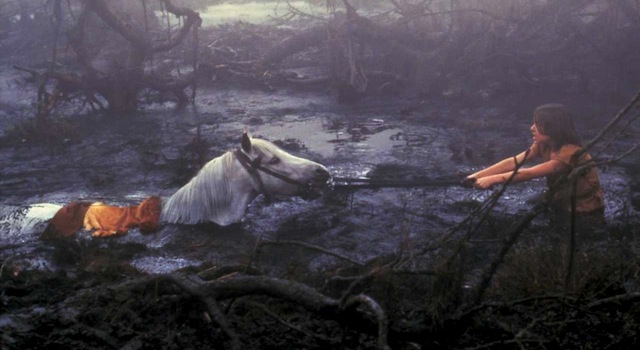

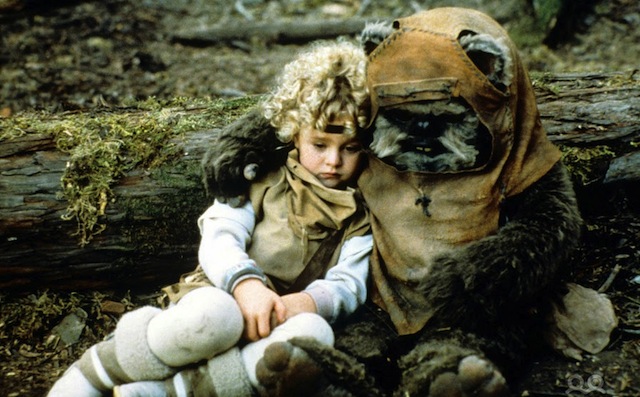
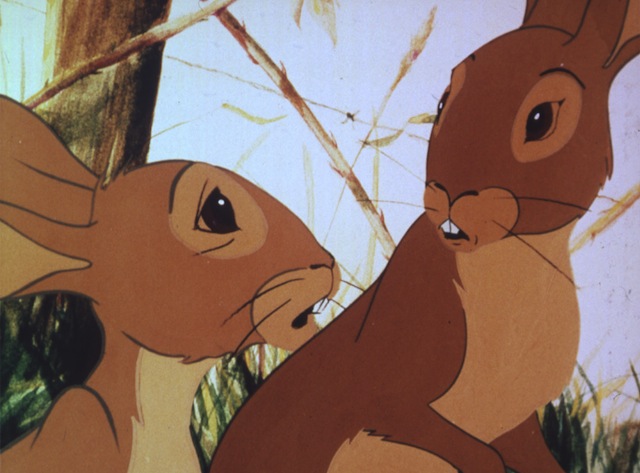
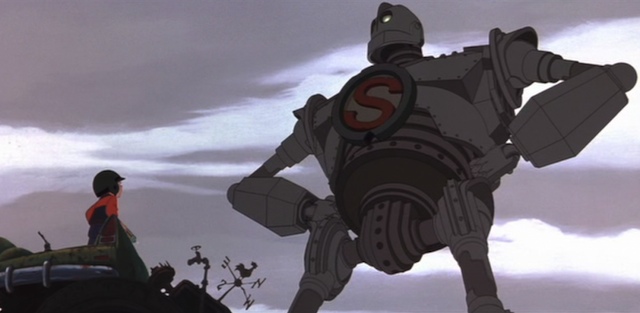
Oh Lord, Iron Giant. I saw it on TV about a month ago, and I managed not to cry, because my heart is stone.
I vividly remember watching The Secret of NIMH at school and being absolutely captivated – loved it so much read the book straightaway which was even better (although the sequel was pretty dire!). It’s one of my childhood books that is still a stand-out.
Watership Down, still quite a tough watch now I’m an adult!
The one that gutted me first was the bittersweet ending of The Last Unicorn (yep, book adaptations all around!). My little kiddo emotional vocabulary wasn’t rich enough to explain why I was so upset by it, and I just remember attempting to articulate something about her need to leave her friends while sobbing brokenly at my confused-looking mother after I caught it on TV one afternoon.
As an adult, the ending now seems a bit sad but very right and fitting, so it doesn’t get me anymore. But instead, Molly’s “how dare you come to me now, when I am this,” which I didn’t at all get as a kid, destroys me.
And in the opposite corner, I give you ET.
Still gets me, and I’m 46 now.
Totally with you, except for the Ewok scene.
@fireweaver One of the most difficult things about The Last Unicorn for me, as a boy, was that Prince Lir does not end up with the Lady Amalthea and live happily ever after. It took me a while to figure out how that was linked to Molly Grue’s fury at the unicorn; that women have lives that don’t necessarily connect with what fairy tales spell out for them, and that even men who are heroes don’t “get” the girl at the end. That a woman is not a prize to be won by defeating evil.
Baron Harkonnen’s sexual assault/murder in Dune, both book and movie, was deeply unsettling. I re-read and re-watched that a bunch. Lynch really made it creepily erotic in ways that I didn’t understand fully until after seeing some of his other movies.
The ending of the “Jurassic Bark” episode of Futurama, along with “The Luck of the Fryrish”. All the feels. All of them.
The death of Artax – so many feels.
Watership Down remains a traumatic experience for me, a trauma reinforced a few years ago by the 2013 John Lewis Christmas Advert, into which various people spliced some of the more terrifying Watership Down scenes in an obvious attempt to mess with the heads of eighties kids.
Moral of the story – don’t buy a bear an alarm clock for Christmas. Bad things will happen.
Wall-E. Gets me every time, when he gets all crushed up, and then when he doesn’t recognise Eve. And yes I was an adult when I watched it.
Oh boy. SO many possibilities, including:
– The end of “Labrynth” when Sara stands up to Jareth and misses her chance to be the Goblin Queen. And yes, now that I’m older I realize that this is symbolic of how being an adult means you sometimes have to put family and responsibility before personal desire, as well as not fall for the first “bad boy” you meet. But I DON’T CARE because DAVID BOWIE.
– The scene in “Legend” when the male unicorn dies because Lily has broken a rule that a pantless Tom Cruise never thought to tell her about. (This always reminds me of the “sinful/disobedient woman” trope, going back to Eve.) Also from that same movie: when Liliy frees the other unicorn, fully expecting that Tim Curry’s magnificent devil character is going to kill her.
– The Luke/Darth Vader scene at the end of “Return of the Jedi.” I was too young to see it in theatres, but it seemed to run on tv pretty much EVERY Sunday afternoon when I was growing up.
– Kyle’s death scene in the original “Terminator.” My mom let me watch it on television probably LONG before I should have been seeing R-rated movies. :P Even as a kid I remember getting choked up about how Sarah Connor gets him moving after a mortal wound by calling him “soldier.” Also the scene at the very end with the gas station and the picture. I’m sorry, but I don’t really care about the movie sequels and the television show. THAT is how the story should have ended, IMHO
@StLOrca: I didn’t get into “Futurama” until I was an adult, but I periodically binge-re-watch it on Netflix every year or so. I have watched the episode “Jurassic Bark” exactly ONCE and am NEVER going to watch it again. *sniffle* I haven’t got a source on this one, but I remember reading somewhere that the episode upset the voice actors for the main characters so much that they still don’t really talk about it. If you’ve watched the four movies and the newer episodes, it seems like the writers were deliberately trying to make that episode less *soul-crushingly* sad. :)
Jeez, that top image. It’s like Moonchild is staring into my soul. But yes, all of the examples given are correct.
The 1984 short adaptation of Corduroy. Pretty much the whole damn thing.
It was only as an adult that I identified all those childhood tears with the personal reality of feeling broken and the sudden, bone-chilling realisation of having lost something essential, forever, ineffectually chasing the one thing that could make you feel whole and turn the world right-side-up again.
Just yes to Watership Down. Straight epic but straight epically disturbing.
And I love The Neverending Story, book and film.